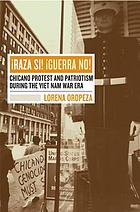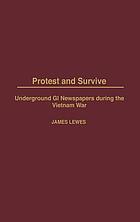
Writing in Vietnam and Other American Fantasies, H. Bruce Franklin recalls the crucial role played by combat veterans of Vietnam in the movement to end the war. The consciousness-raising effect of the war on those who fought it is documented in David Zeiger’s film Sir! No Sir!. The story of in-service resistance validates Milton Bates’s observation made in The Wars We Took to Vietnam: Cultural Conflict and Storytelling that public memory in the United States of the country’s own race, class, gender, and generational conflicts as it stood in the early 1960s factored into the institutional cultures that accompanied the military to Southeast Asia. Penny Lewis (Hardhats, Hippies, and Hawks) enhances that validation, as does John Darrell Sherwood’s Black Sailor, White Navy: Racial Unrest in the Fleet during the Vietnam War Era. Lorena Oropeza’s Raza Si! Guerra No!: Chicano Protest and Patriotism during the Viet Nam War Era recaptures the otherwise lost history of the Mexican American relationship with US military institutions while focusing on the antiwar movement that emerged out of the radical expressions of Chicano nationalism in the 1960s and 1970s. Herman Graham III’s account of racial conflict in the ranks in The Brothers’ Vietnam War: Black Power, Manhood, and the Military Experience has resonance with the current situation as domestic racial tensions intersect, once again, with the racial themes of US wars in the Middle East and Africa. The author’s chapter on the resistance to the draft waged by boxing champion Muhammad Ali is reason enough for it to be on library shelves, while other chapters complement studies of masculinity.
Andrew Hunt’s The Turning: A History of Vietnam Veterans against the War is a thorough study of the veterans’ organization (VVAW) that came out of that period. Richard Stacewicz provides a set of antiwar veterans’ memoirs in his Winter Soldiers: An Oral History of the Vietnam Veterans against the War. Dick Perrin’s story of his in-service opposition, known for years by many movement veterans, was finally written in 2006 as G.I. Resister: The Story of How One American and His Family Fought the War in Vietnam. Perrin went AWOL from the army in Germany and then lived as a deserter in Paris, where he educated himself and others, including actress Jane Fonda, on the war that Americans were waging in Vietnam.
Not all GI and veteran opposition to the war stemmed from principled pacifism, courageous whistle-blowing, or anti-imperialist convictions. By the late 1960s, the countercultural currents coursing through the youth rebellion flowed with young recruits into the military, where they eroded discipline and exacerbated the breakdown of combat readiness. As it was for their stateside peers, music was the lingua franca of a refusenik attitude among GIs that is captured by Doug Bradley and Craig Werner in We Gotta Get out of This Place: The Soundtrack of the Vietnam War. Meredith Lair in Armed with Abundance: Consumerism & Soldiering in the Vietnam War details the many other ways in which the reality of the Vietnam experience for many GIs belied the Hollywood imagery of in-country hardships. Lair’s book can also be read as a comment on the mystique of men and war in which popular notions of masculinity take shape. James Lewes’s catalog of GI newspapers, Protest and Survive: Underground GI Newspapers during the Vietnam War, is essential for this category as well.
 Raza sí! Guerra no!: Chicano protest and patriotism during the Viet Nam war era
by
Raza sí! Guerra no!: Chicano protest and patriotism during the Viet Nam war era
by
 Protest and survive: Underground GI newspapers during the Vietnam War
by
Protest and survive: Underground GI newspapers during the Vietnam War
by